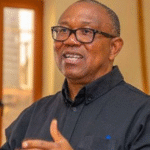Former presidential aide Reno Omokri has dismissed claims that Lagos is a no man’s land as peddled by some netizens.
He also revealed that Lagos did not become great because it was Nigeria’s former capital.
Slamming those who say Lagos stinks, Omokri wondered why they were yet to relocate from the city.
This was contained in a lengthy piece he shared on Facebook.
He wrote, “I do not know whether it is orchestrated, but of recent, I keep seeing a lot of effort put into deemphasising Lagos as part of the Lukumi Yoruba Southwest, and instead rebrand it as a No-Man’s-Land that became what it is because it was once Nigeria’s capital.
“First of all, we need to understand that Nigeria only exists because three regions, namely the Northern, Western and Eastern regions were cobbled together by the British when they amalgamated Northern and Southern Nigeria on January 1, 1914, and made Lagos the capital of the new country, because Lagos was already a modern metropolis that could provide all the infrastructure needed by the British to run the new country.
“Prior to that, Lagos was annexed from Yorubaland by the British in 1861. And before then, it was a part of Yorubaland under the overlordship of the Oba of Benin.
“These are facts.
“In other words, when the Federal Military Government moved the capital of Nigeria from Lagos to Abuja Federal Capital Territory on Thursday, December 12, 1991, Lagos, as a city; devolved back to the Lagos State Government, which is a member of the Oodua group of states.
“And when the Federal Military Government created the six geopolitical zones after the recommendation of the Alex Ekwueme panel in 1997, Lagos became part of the Southwest region.
“So Lagos is not a no-man’s-land. It is just like Kaduna, Enugu, or Port-Harcourt. It has indigenous peoples and settlers.
“And for those who think they developed Lagos and that is why it became the capital of Nigeria, please note the following.
“There is a census of Lagos dating from 1914, and at that time, other than Northerners, Lagos’s demographic was dominated almost exclusively by Lukumi Yorubas. And it was already developed.
“Lagos became the capital of Nigeria in 1914. Whereas, Carter Bridge was built in 1901, and the first electric power generation plant in Nigeria was built in Lagos in 1886. Also, the Iddo rail terminus was built in 1900.
“Please fact-check me: The reason Carter Bride was built was because of the heavy vehicular traffic in Lagos, which led to the deaths of pedestrians, even where pedestrian bridges were provided along with bus stops.
“Now, some people say Lagos is smelling. However, do you see this open defecation that is now leading to arrests in Lagos? Please fact-check me: It is not in the character of Lagos and Lagosians. The behaviour was imported into Lagos by migrants.
“How do we know this? Because the first public toilets and night soil disposal unit in Nigeria were built at Ebute-Elefun, Lagos, in 1900 and from there spread to other parts of Lagos.
“If Lagos already had the longest bridge in West Africa by 1901, along with a power generating plant, sewer systems, a functioning rail network, and a municipal bus service as well as a ferry system, it would appear that it was Lagos’s development that led to the choice of the city being made the capital of Nigeria, not vice versa.
“After all, Calabar was the first capital of Southern Nigeria from 1884 to 1906, yet it is not as developed as Lagos. Also, Lagos stopped being Nigeria’s capital thirty-three years ago on December 12, 1991.
“However, since that date, Lagos’s economy has multiplied by four. And Lagos’s economy has grown faster than the economy of the new Federal Capital Territory, Abuja.
“So, it looks like the capitalisation of Lagos prevented its development rather than the other way around. Wouldn’t you say so, given the facts?
“Every day, Lagos’s population increases by 6000, of which most of the people come by night bus. Many of these people have no adequate accommodation. They just troop into Lagos and many of them will engage in open defecation and dumping of refuse, which they usually do at night.
“And after they do this, less informed people will come on social media and say Lagos stinks.
“But I have yet to see an indigenous Lagosian say so. Such comments are usually always from non Lagosians. I could go on to say they are made by people from outside the Southwest.
“Which begs the question: If Lagos has a stench that bothers you, why have you not relocated back to where you originated from?”



